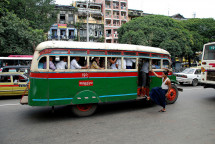Burma’s Ethnic Challenge: From Aspirations to Solutions
Temas
Regiones
“Important steps have been made in national reconciliation during the past two years. But promises and ceremonies will never be enough. The long-standing aspirations of Burma’s peoples for peace and justice must find solutions during the present time of national transition.”

Autores
The present time of national transition must be used for inclusive solutions that involve all peoples of Burma to end the legacy of state failure. The most important changes in national politics have started in many decades. Now all sides have to halt military operations and engage in socio-political dialogue that includes government, military, ethnic, political and civil society representatives.
Political agreements will be essential to achieve lasting peace, democracy and ethnic rights. National reconciliation and equality must be the common aim. The divisive tradition of different agreements and processes with different ethnic and political groups must end.
In building peace and democracy, people-centred and pro-poor economic reforms are vital. Land-grabbing must halt, and development programmes should be appropriate, sustainable and undertaken with the consent of the local peoples.
Humanitarian aid should be prioritized for the most needy and vulnerable communities and not become a source of political advantage or division. As peace develops, internally displaced persons and refugees must be supported to return to their places of origin and to rebuild divided societies in the ethnic borderlands.
The international community must play a neutral and supportive role in the achievement of peace and democracy. National reform is at an early stage, and it is vital that ill-planned strategies or investments do not perpetuate political failures and ethnic injustice.
This all can only be achieved through transparent and inclusive processes that truly address long-standing political and ethnic needs. Challenges must be faced up to – not downplayed or ignored.
photo by Thomas Z H Zhu
Pages: 20